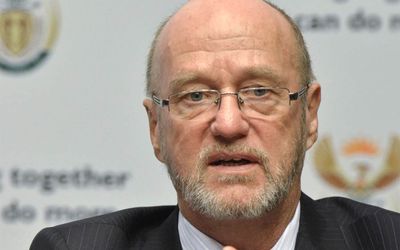THE Bloomberg Global Innovation Index 2013 ranks South Africa just 50th out of 96 countries on its level of innovation. Yet Science and Technology Minister Derek Hanekom believes South Africa’s sizeable innovation portfolio keeps it well positioned in the global marketplace.
Hanekom, who was a keynote speaker at last month’s Accenture Innovation Index and Awards function, says this includes groundbreaking innovations such as the world-first digital laser technology developed by the Council for Scientific and Industrial Research (CSIR), with potential for application in fields ranging from communication to medicine; and First National Bank’s cashless ATM, capable of delivering full digital banking to remote rural areas. These and other innovations were revealed through the Accenture Innovation Index.
He cites further examples, including PriceCheck’s international recognition as International App of the Year at the BlackBerry Live conference; as well as international collaboration on field trials of a prototype methanol-fuelled home generator with the potential to provide economical electric power to remote rural African households.
"Internationally, there is a high regard for our innovation in fields of clinical medicine, environmental science and the physical sciences," says Hanekom.
Yet he is the first to admit that more can be done. He says the department of science and technology is working closely with partners in the business sector and the National System of Innovation to communicate the potential and opportunities in South Africa’s system of innovation.
"Doing business in South Africa and investing in South Africa are not only dependent on the degree of innovativeness of South Africans, but are clearly also influenced heavily by the status of the global economy and the signals that publications such as Business Day and our business people communicate to global investors."
Hanekom says both innovation and entrepreneurship are necessary to enhance the capacity to innovate nationally. He emphasises that it would be counterproductive to consider these as "either/or" options, as both aspects are crucial in the process of converting innovative ideas into socioeconomically relevant products and services.
"It is, of course, by now widely accepted that innovation extends beyond invention and science-based novelty driven by publicly funded research and development. Instead, innovation is often the result of technology development and process improvements that are the result of the entrepreneurial effort and genius of private individuals and organisations. The national, publicly funded R&D agenda needs to be effectively balanced to support such efforts," says Hanekom.
"The importance of the development of entrepreneurship programmes is rooted in the recognition that identifying new and innovative ways to address poverty, inequality and the burden of disease, to name but a few, will require an intensification of R&D spending, as well as targeted support to grow and diversify the country’s skills base and innovation capabilities," he adds.
He points out that the National Development Plan, in the first five years, emphasises the need to absorb more, and especially young, people into economic activity. "More effort is required, now and in the long term, to develop and harness the latent entrepreneurial capabilities among South Africa’s young people in particular."
This will require a concerted national effort to promote the development of South African techno-entrepreneurs. "This should ideally be an integral part of one’s learning experience from the first day of school so that pupils are encouraged to recognise and seize opportunities when and where they arise, and to adapt themselves to rapid and ongoing technological changes."
The private sector in these developments is seen as being critical. "It is against this background that I would like to acknowledge and congratulate the organisers and participants of the Accenture Innovation Index on their energy and rigour in sharing their innovation experiences with us. This type of engagement is key to driving robust national discussions on the future trajectory of South African innovation," he says.
© BDlive 2013

Tourism Minister Derek Hanekom. Picture: SOWETAN
THE Bloomberg Global Innovation Index 2013 ranks South Africa just 50th out of 96 countries on its level of innovation. Yet Science and Technology Minister Derek Hanekom believes South Africa’s sizeable innovation portfolio keeps it well positioned in the global marketplace.
Hanekom, who was a keynote speaker at last month’s Accenture Innovation Index and Awards function, says this includes groundbreaking innovations such as the world-first digital laser technology developed by the Council for Scientific and Industrial Research (CSIR), with potential for application in fields ranging from communication to medicine; and First National Bank’s cashless ATM, capable of delivering full digital banking to remote rural areas. These and other innovations were revealed through the Accenture Innovation Index.
He cites further examples, including PriceCheck’s international recognition as International App of the Year at the BlackBerry Live conference; as well as international collaboration on field trials of a prototype methanol-fuelled home generator with the potential to provide economical electric power to remote rural African households.
"Internationally, there is a high regard for our innovation in fields of clinical medicine, environmental science and the physical sciences," says Hanekom.
Yet he is the first to admit that more can be done. He says the department of science and technology is working closely with partners in the business sector and the National System of Innovation to communicate the potential and opportunities in South Africa’s system of innovation.
"Doing business in South Africa and investing in South Africa are not only dependent on the degree of innovativeness of South Africans, but are clearly also influenced heavily by the status of the global economy and the signals that publications such as Business Day and our business people communicate to global investors."
Hanekom says both innovation and entrepreneurship are necessary to enhance the capacity to innovate nationally. He emphasises that it would be counterproductive to consider these as "either/or" options, as both aspects are crucial in the process of converting innovative ideas into socioeconomically relevant products and services.
"It is, of course, by now widely accepted that innovation extends beyond invention and science-based novelty driven by publicly funded research and development. Instead, innovation is often the result of technology development and process improvements that are the result of the entrepreneurial effort and genius of private individuals and organisations. The national, publicly funded R&D agenda needs to be effectively balanced to support such efforts," says Hanekom.
"The importance of the development of entrepreneurship programmes is rooted in the recognition that identifying new and innovative ways to address poverty, inequality and the burden of disease, to name but a few, will require an intensification of R&D spending, as well as targeted support to grow and diversify the country’s skills base and innovation capabilities," he adds.
He points out that the National Development Plan, in the first five years, emphasises the need to absorb more, and especially young, people into economic activity. "More effort is required, now and in the long term, to develop and harness the latent entrepreneurial capabilities among South Africa’s young people in particular."
This will require a concerted national effort to promote the development of South African techno-entrepreneurs. "This should ideally be an integral part of one’s learning experience from the first day of school so that pupils are encouraged to recognise and seize opportunities when and where they arise, and to adapt themselves to rapid and ongoing technological changes."
The private sector in these developments is seen as being critical. "It is against this background that I would like to acknowledge and congratulate the organisers and participants of the Accenture Innovation Index on their energy and rigour in sharing their innovation experiences with us. This type of engagement is key to driving robust national discussions on the future trajectory of South African innovation," he says.
© BDlive 2013






















Change: -1.52%
Change: -1.70%
Change: -1.84%
Change: -1.60%
Change: -1.52%
Data supplied by Profile Data
Change: -0.64%
Change: 0.12%
Change: -1.52%
Change: 0.00%
Change: 0.10%
Data supplied by Profile Data
Change: 0.73%
Change: -0.11%
Change: 0.63%
Change: 1.18%
Change: 1.40%
Data supplied by Profile Data
Change: 0.72%
Change: 0.71%
Change: -0.13%
Change: 0.33%
Change: -0.15%
Data supplied by Profile Data